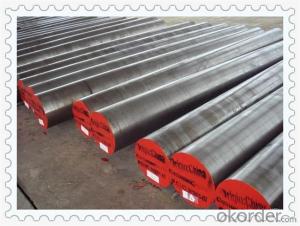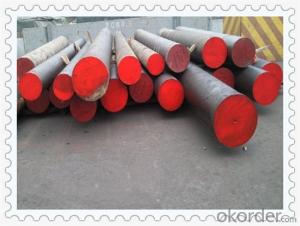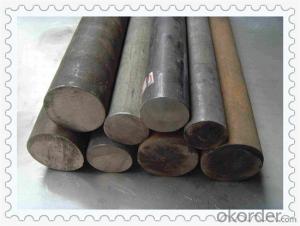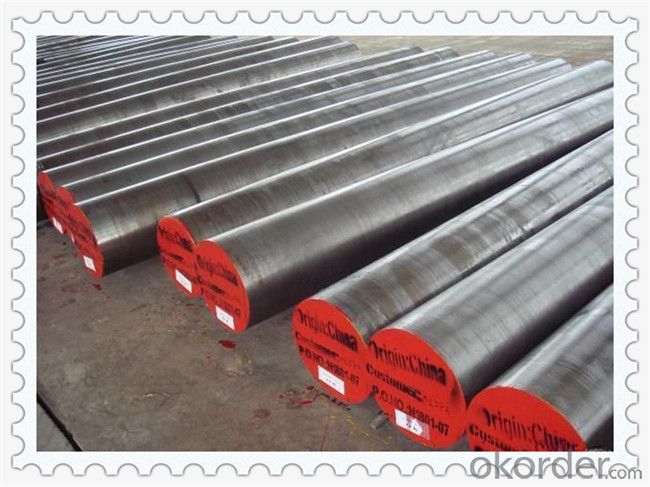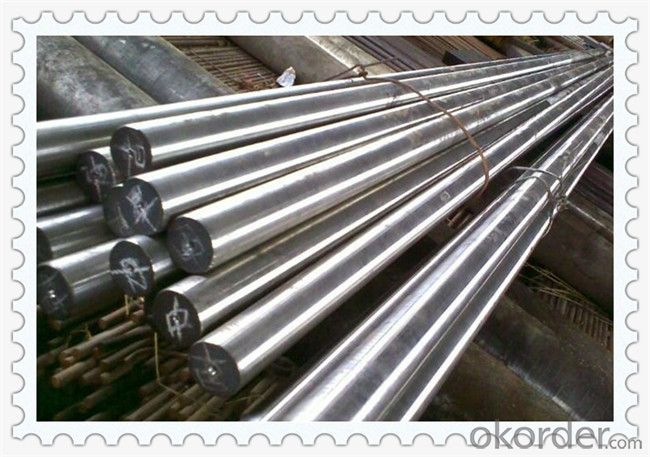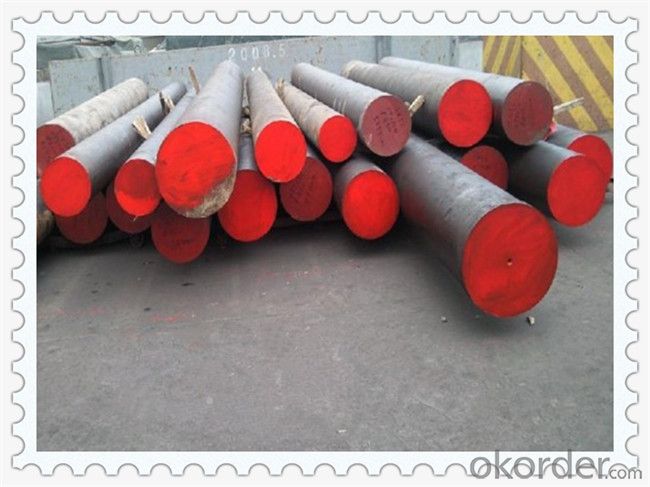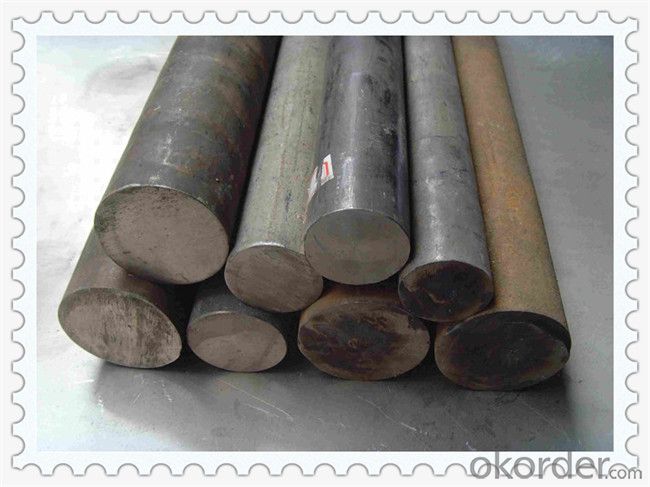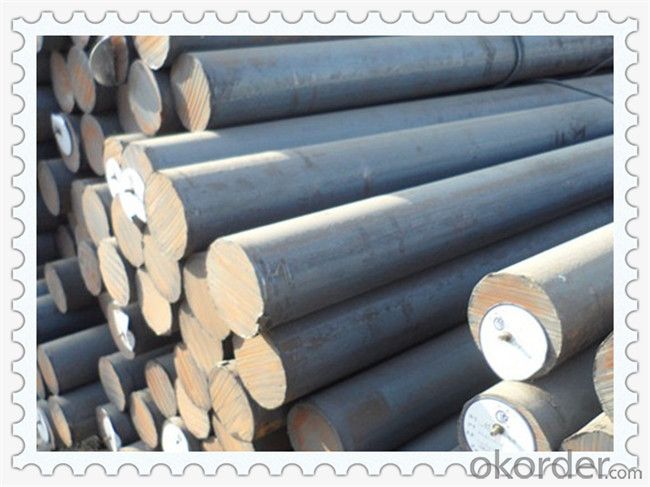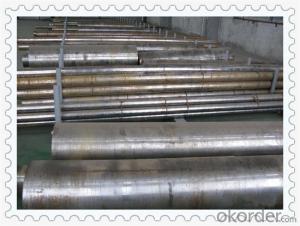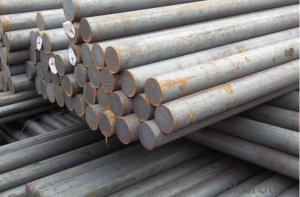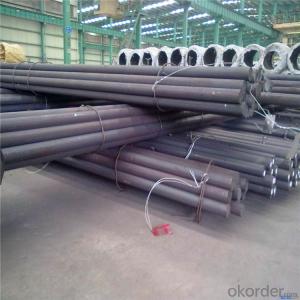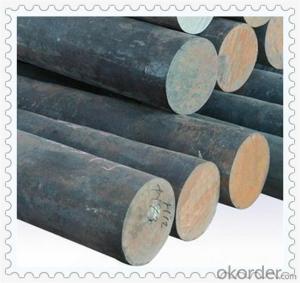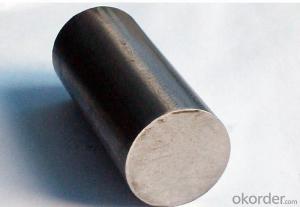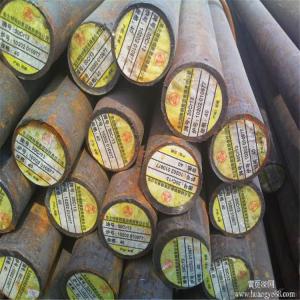AISI 4340 Forged Round Steel Bars
- Loading Port:
- China main port
- Payment Terms:
- TT OR LC
- Min Order Qty:
- 30 m.t.
- Supply Capability:
- 10000 m.t./month
OKorder Service Pledge
OKorder Financial Service
You Might Also Like
AISI 4340 Forged Round Steel Bars
Products Details
| aisi 4340 forged steel round bars | |||||||||||
| Comparative standard | Grade | C | Si | Mn | Cr | Mo | V | W | P | S | Ni |
| GB | 40CrNiMoA | 0.36-0.44 | 0.10-0.350 | 0.45-0.70 | 1.10-1.40 | 0.20-0.35 | 0.03 | 0.02 | 1.30-1.7 | ||
| AISI | 4337/4340 | ||||||||||
| JIS | SNCM8 | ||||||||||
| DIN | 34CrNiMo6/1.6582 | 0.34 | max 0.40 | 0.65 | 1.50 | 0.23 | 0.03 | 0.03 | 1.50 | ||
| Dimensions | |||||||||||
| Round bar | |||||||||||
| Dia:10mm~700mm | Length:2m~6m | ||||||||||
| Flat bar | |||||||||||
| Thickness:10mm~500mm | Length:2m~12m | ||||||||||
| *Dimensions can be customized | |||||||||||
| Heat Treatment | |||||||||||
| Normalizing | 850-880°C | - | |||||||||
| Stress Relieving | 650°C | air cooling | |||||||||
| Quenching | 830-860°C | oil quenching | |||||||||
| Tempering | 540-660°C | ||||||||||
| 1.Normalizing | |||||||||||
| Normalizing temperature : 850-880°C | |||||||||||
| 2.Stress Relieving | |||||||||||
| Stress relieving to remove machining stresses should be carried out by heating to approx.650°C, | |||||||||||
| holding for 1-2 hours at heat,followed by air cooling . | |||||||||||
| This operation is performed to reduce distortion during heat treatment . | |||||||||||
| 3.Hardening | |||||||||||
| Harden from a temperature of 830-860°C followed by oil quenching. | |||||||||||
| Quenching temperature in the end quench test is 850°C. | |||||||||||
| 4.Tempering | |||||||||||
| tempering temperature: 540-660°C | |||||||||||
| Detail information | |||||||||||
| Process | EAF+LF+VD+Forging+(Rolling)+Annealing Condition (optional) | ||||||||||
| Delivery Condition | Hot forged+Rough machined/turned surface | ||||||||||
| MOQ | 1 ton | ||||||||||
| Technical Data | According to customer’s requirements of chemical composition, physical properties and mechanical testing | ||||||||||
| Ultrasonic Test | Ultrasonic test according to SEP 1921-84 G3 D/d E/d | ||||||||||
| Applications | |||||||||||
| Hot extrusion dies, forging die forging hammer, forging press die, precision forging die well as aluminum, copper and alloys die-casting mold. | |||||||||||
| Relevant documents | |||||||||||
| Contract Documents | Contract, Debit Note, PI(Performa Invoice) | ||||||||||
| Shipping Documents | B/L(Bill of Loading), Packing List, Shipping list, CI(Commercial Invoice) | ||||||||||
| Certifications | SGS, ISO9001-2008, UT(Ultrasonic Test), CO(Certificate of Original), MTC(Milling Test Certificate) | ||||||||||
Products Show
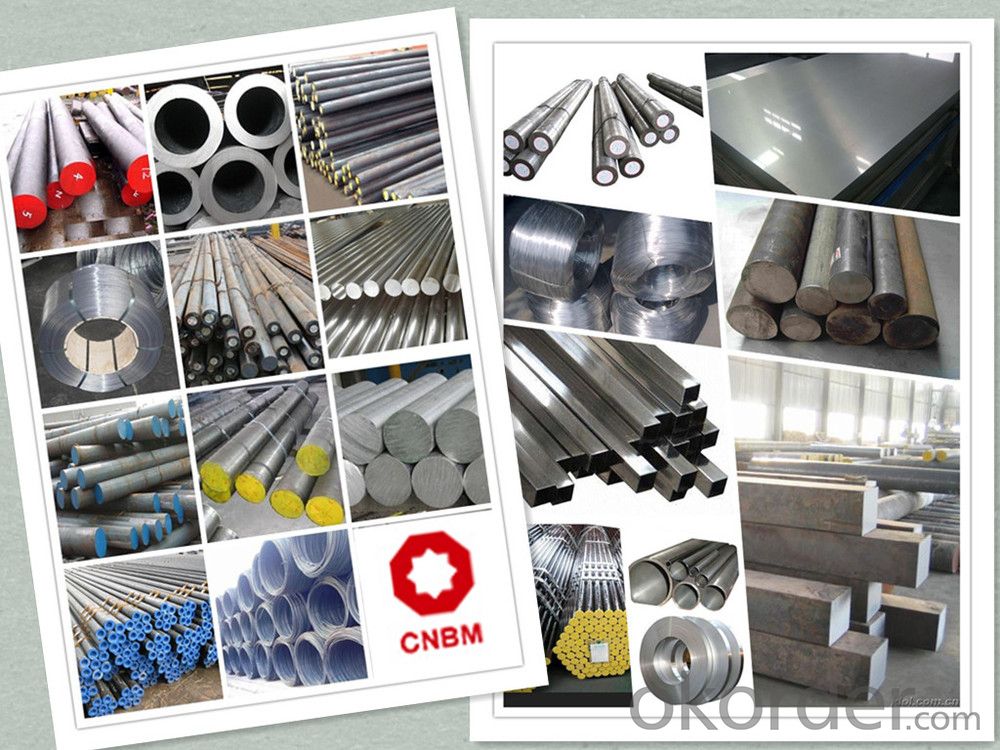
Product Overviews
| Product Name | Typical Grades | Diameter(mm) | Standard adopted |
| Carbon Steel | 20 (1020/S20C/C22) | Ø16-Ø300 |
GB/SAE/JIS/DIN
|
| 40 (1040/S40C/C40) | |||
| 45 (1045/S45C/C45) | |||
| Bearing Steel | GCr9 (51100/SUJ1) | Ø12-Ø250 | |
| GCr15 (52100/SUJ2/100Gr6) | |||
| GCr9SiMn (A485-Gr.1/SUJ3) | |||
Cr-Mo Steel | 20Cr (5120/SCr420H/20Cr4) | Ø12-Ø250 | |
| 40Cr (5140/SCr440/41Cr4) | |||
| 42CrMo(4140/SCM440/42CrMo4) | |||
| Gear Steel | 20CrNiMo | Ø16-Ø600 | |
| 20CrMn(5115/SMnC420/20MnCr5) | |||
| 20CrNiMo(8620/SNCM220/20CrMiMo2) |
Application
| Carbon Steel | Mold bottom, Plastic mold, Construction machinery parts Automobile parts, Security grills, Screens, Construction |
| Bearing Steel | Aerospace, Navigation, Nuclear energy, Chemical industry Electronic information, Petrochemical, Instrument and meter Transportation |
| Cr-Mo Steel | Mechanism & Fasteners gear, Stressed components for vehicles Engines and machines, Parts of larger cross-section |
| Gear Steel | All kinds of gears, Statically and dynamically stressed component for vehicles Engines and machine, Larger cross-section parts, Crankshafts |
Work Shop
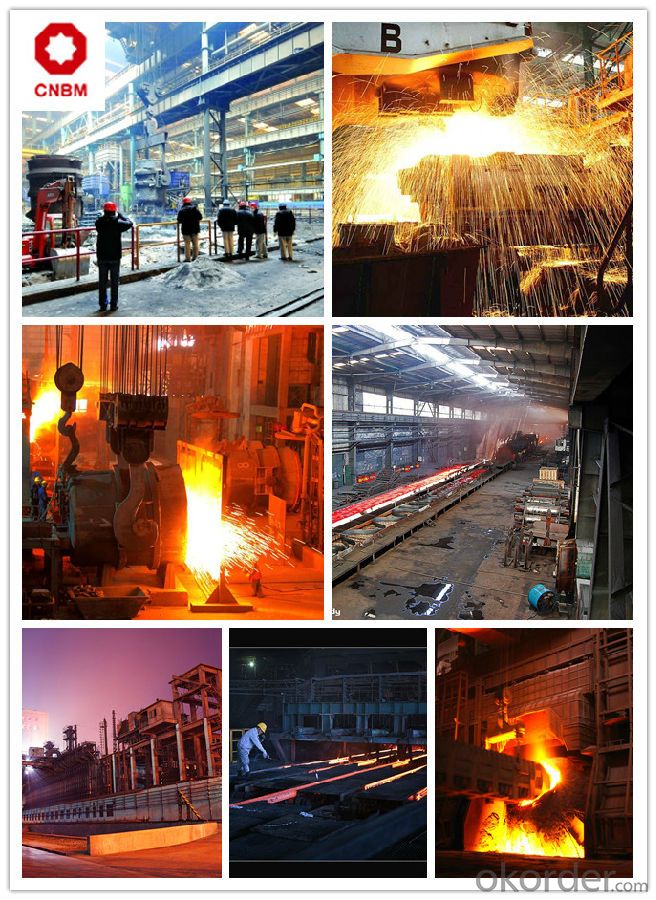
Company Information
CNBM International Corporation is the most important trading platform of CNBM group.
Whith its advantages, CNBM International are mainly concentrate on Cement, Glass, Iron and Steel, Ceramics industries and devotes herself for supplying high qulity series of refractories as well as technical consultancies and logistics solutions.

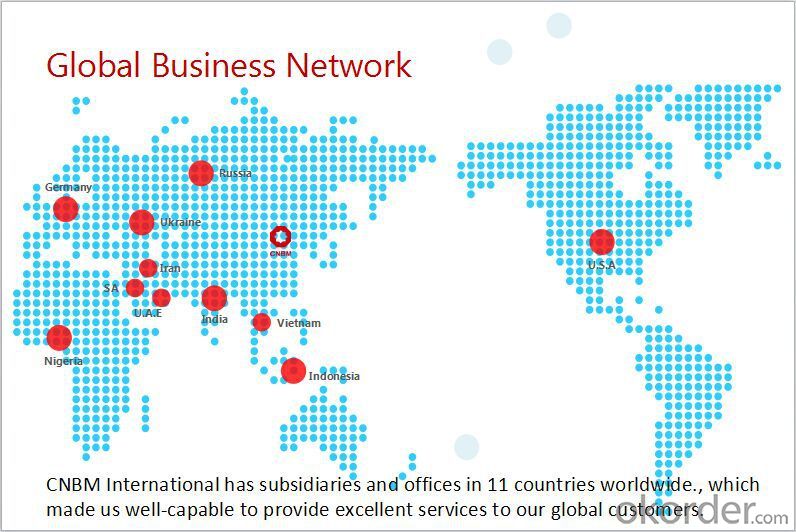
FAQ
1, Your advantages?
professional products inquiry, products knowledge train (for agents), smooth goods delivery, excellent customer solution proposale
2, Test & Certificate?
SGS test is available, customer inspection before shipping is welcome, third party inspection is no problem
3, Factory or Trading Company?
CNBM is a trading company but we have so many protocol factories and CNBM works as a trading department of these factories. Also CNBM is the holding company of many factories.
4, Payment Terms?
30% TT as deposit and 70% before delivery.
Irrevocable L/C at sight.
5, Trading Terms?
EXW, FOB, CIF, FFR, CNF
6, After-sale Service?
CNBM provides the services and support you need for every step of our cooperation. We're the business partner you can trust.
For any problem, please kindly contact us at any your convenient time.
We'll reply you in our first priority within 24 hours.
Packaging & Delivery
1, Packaging: seaworthy package or as required
2, Delivery: 35-45 days or based on quantity
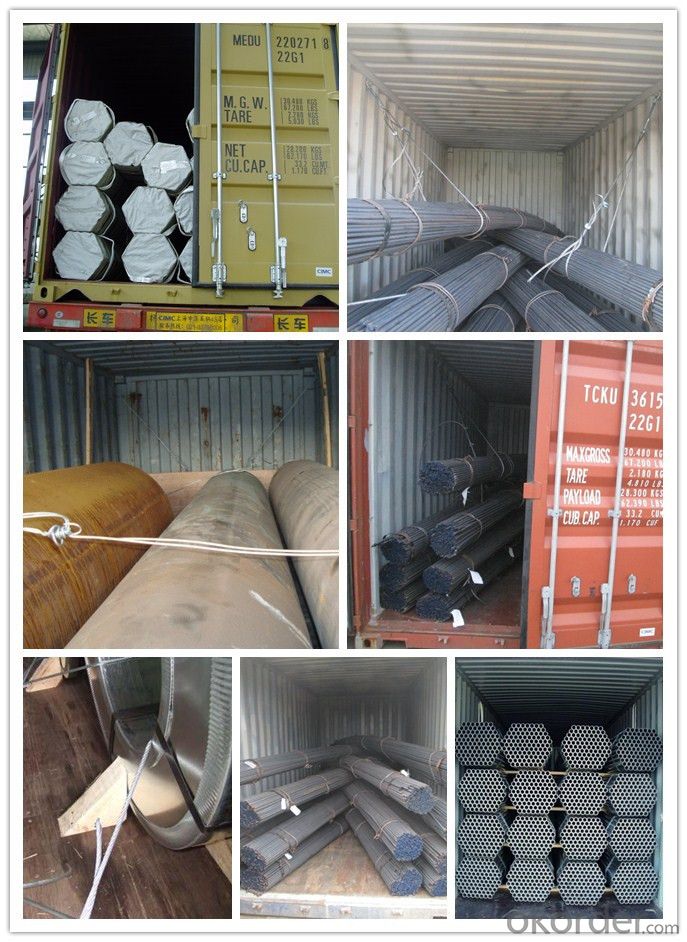
- Q: How are steel round bars used in the manufacturing of conveyor systems?
- Steel round bars are commonly used in the manufacturing of conveyor systems as they provide the necessary strength and durability for supporting heavy loads, guiding conveyor belts, and maintaining stability. These bars are often used as support beams, rollers, and shafts within the conveyor system, ensuring efficient movement of materials along the production line.
- Q: What are the different types of steel round bar machining processes?
- There are several different types of steel round bar machining processes, including turning, milling, drilling, grinding, and threading. Each process serves a specific purpose and is used to shape the steel round bar into a desired form or size.
- Q: What are the advantages of using chromium-vanadium alloy steel round bars?
- There are several advantages of using chromium-vanadium alloy steel round bars: 1. High Strength: Chromium-vanadium alloy steel is known for its exceptional strength and hardness. It has a high tensile strength, making it suitable for applications that require heavy-duty performance and resistance to wear and tear. 2. Durability: The addition of chromium and vanadium elements enhances the durability of the alloy steel round bars. It provides excellent resistance to corrosion, oxidation, and high temperatures, making it ideal for use in harsh environments. 3. Versatility: Chromium-vanadium alloy steel round bars offer versatility in various applications. They can be used for manufacturing tools, springs, gears, and other components that require high strength and durability. The versatility of this alloy steel makes it a preferred choice in industries such as automotive, aerospace, and construction. 4. Machinability: Chromium-vanadium alloy steel is relatively easy to machine and work with, making it convenient for manufacturers. It can be easily shaped, cut, and formed into desired shapes and sizes without compromising its mechanical properties. 5. Cost-Effective: Despite its excellent properties, chromium-vanadium alloy steel round bars tend to be more cost-effective compared to other high-performance alloys. This makes it a popular choice for industries that require strong and durable materials without exceeding their budget. 6. Fatigue Resistance: Chromium-vanadium alloy steel exhibits exceptional fatigue resistance, making it suitable for applications that involve repetitive stress or cyclic loading. It can withstand repeated use and maintain its structural integrity over an extended period. Overall, chromium-vanadium alloy steel round bars offer a combination of high strength, durability, versatility, and cost-effectiveness. These advantages make it a preferred material choice for various industrial applications where reliability and performance are crucial.
- Q: What are the different types of steel round bar profiles?
- In the market, one can find various steel round bar profiles. Among the most commonly used profiles are: 1. Plain Round Bar: This profile is the most basic and widely used. It consists of a solid cylindrical bar with a smooth surface and a consistent diameter throughout its length. 2. Deformed Round Bar: This type of round bar features deformations or ribs on its surface. These deformations enhance the bond between the bar and concrete, making it ideal for construction applications requiring reinforced concrete structures. 3. Hollow Round Bar: As the name suggests, this profile has a hollow center. It is often utilized in industries where weight reduction is crucial or when the round bar needs to serve as a conduit for fluids or gases. 4. Threaded Round Bar: This profile is characterized by threads along its length, enabling easy screwing into other components. It is commonly employed in applications that require secure fastening or adjustability. 5. Half-Round Bar: With one flat side and one rounded side, this profile takes on a semi-circular shape. It is frequently used in decorative applications, such as handrails, where an aesthetically pleasing appearance is desired. 6. Square Bar: Although not strictly a round profile, square bars are often included in this category. They possess four equal sides and find common use in applications that demand higher torsional strength. 7. Hexagonal Bar: Similar to square bars, hexagonal bars have six equal sides. They are often employed in applications that require high torque resistance or when a distinctive appearance is desired. These represent just a few of the available steel round bar profiles. The selection of a profile depends on specific application requirements, such as structural strength, bonding capabilities, or aesthetic considerations.
- Q: What are the advantages of using nickel-molybdenum-vanadium alloy steel round bars?
- One advantage of using nickel-molybdenum-vanadium alloy steel round bars is their high strength and toughness. This makes them suitable for applications that require resistance to heavy loads and impact. Additionally, these alloy steel round bars have excellent corrosion resistance properties, making them ideal for use in environments with high humidity or exposure to chemicals. Furthermore, the addition of nickel, molybdenum, and vanadium enhances the material's heat resistance, making it suitable for high-temperature applications.
- Q: Can steel round bars be used in the agriculture industry?
- Yes, steel round bars can be used in the agriculture industry. They are commonly used in various applications such as constructing farm equipment, fencing, and building structures. Steel round bars are known for their strength and durability, making them suitable for heavy-duty tasks in the agriculture sector. Additionally, steel round bars can withstand harsh weather conditions and resist corrosion, ensuring their longevity and reliability in agricultural settings. Overall, steel round bars are a versatile and practical choice for the agriculture industry due to their strength, durability, and resistance to environmental factors.
- Q: Can steel round bars be used for making automotive chassis?
- Yes, steel round bars can be used for making automotive chassis. Steel is a commonly used material in automotive chassis due to its high strength and durability. Round bars made of steel provide excellent structural integrity and can withstand the heavy loads and forces experienced by a vehicle's chassis. The use of steel round bars in automotive chassis also helps improve the overall safety of the vehicle by providing a strong and rigid frame. Additionally, steel is relatively cost-effective and readily available, making it a popular choice for automotive manufacturers.
- Q: What are the different types of steel round bar finishes for decorative purposes?
- There are several different types of steel round bar finishes that can be used for decorative purposes. Some common options include polished, brushed, hammered, and antique finishes. Each of these finishes provides a unique aesthetic appeal and can be chosen based on the desired look and style for the decorative application.
- Q: What is the difference between a centerless ground and a hot rolled steel round bar?
- The main difference between a centerless ground steel round bar and a hot rolled steel round bar is the manufacturing process. Centerless grinding involves removing material from the bar's outer diameter using abrasive wheels, resulting in a precise and smooth finish. On the other hand, hot rolling involves heating the steel and passing it through a series of rollers to shape it into a round bar, often resulting in a rougher surface. Additionally, centerless ground bars tend to have tighter dimensional tolerances and better surface quality compared to hot rolled bars.
- Q: What are the advantages of using maraging steel round bars?
- Using maraging steel round bars in various applications offers several benefits. Firstly, these bars possess an impressive strength-to-weight ratio, making them ideal for situations where strength is crucial. They can withstand high stress and load-bearing conditions without deforming or failing, ensuring structural integrity. Secondly, maraging steel round bars exhibit exceptional toughness, enabling them to absorb significant amounts of energy before fracturing. This toughness makes them highly resistant to cracking or breaking, even under extreme conditions, enhancing their durability and reliability. Additionally, maraging steel round bars are known for their outstanding corrosion resistance. Unlike other types of steel, they are less prone to rust and oxidation, making them suitable for use in harsh environments or where exposure to moisture or chemicals is a concern. This corrosion resistance helps extend the lifespan of the bars and reduces maintenance costs. Furthermore, maraging steel round bars are relatively easy to machine, despite their high strength and hardness. They can be easily shaped, drilled, and cut into different forms and sizes, allowing for versatile applications across various industries. This ease of machining saves time and effort during the manufacturing process. Moreover, maraging steel round bars have excellent heat treatability, meaning they can be hardened and tempered to further enhance their mechanical properties. This flexibility in heat treatment allows for customization to meet specific project requirements, such as achieving desired hardness levels or improving characteristics like wear resistance or toughness. Lastly, maraging steel round bars are widely used in the aerospace and defense industries due to their exceptional strength, toughness, and corrosion resistance. They are commonly utilized in the manufacturing of critical components such as landing gear, missile casings, and aircraft structures, where reliability and performance are paramount. In conclusion, the advantages of using maraging steel round bars include high strength, superior toughness, corrosion resistance, machinability, heat treatability, and suitability for aerospace and defense applications. These properties make them the preferred choice for demanding industries, ensuring optimal performance and longevity in critical applications.
Send your message to us
AISI 4340 Forged Round Steel Bars
- Loading Port:
- China main port
- Payment Terms:
- TT OR LC
- Min Order Qty:
- 30 m.t.
- Supply Capability:
- 10000 m.t./month
OKorder Service Pledge
OKorder Financial Service
Similar products
Hot products
Hot Searches
Related keywords
